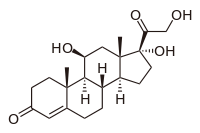
Photo from wikipedia
Adolescent stress predisposes individuals to increased risk for anxiety and depression in adulthood. The stress response is mediated by the glucocorticoid receptor (GR) via regulation of GR-responsive genes involved in… Click to show full abstract
Adolescent stress predisposes individuals to increased risk for anxiety and depression in adulthood. The stress response is mediated by the glucocorticoid receptor (GR) via regulation of GR-responsive genes involved in brain reaction to stress. Although dysregulation of GR in depression is well documented, this is the first study investigating the role of GRα isoforms in pathogenesis of depression. We exposed adolescent male and female C57BL/6J mice to chronic unpredictable stress (CUS) for 12 days starting at postnatal day 28 (PND28). Tests evaluating anxiety and depressive-like behaviors were performed at PND70. We analyzed corticosterone concentrations in serum, levels of GRα isoforms (95, 67, 50, 40, and 25 kDa), and mRNA levels of GR-responsive genes (GR, FKBP5, BDNF, and IL-1β) in the hippocampus and the prefrontal cortex (PFC). CUS increased anxiety and depressive-like behavior in adult animals of both sexes, but did not affect corticosterone serum levels, 95 and 67 kDa GR isoforms. However, the levels of shorter GRα isoforms (50, 40, and 25 kDa) were altered in adult mice underwent CUS, in sex- and brain structure-specific way. Changes in gene expression revealed that female depressive-like behavior could be related to increased levels of IL-1β in hippocampus and reduced BDNF levels in both hippocampus and PFC. However, in males, adolescent CUS increased expression of GR in adult hippocampus and BDNF in PFC. These findings suggest that adolescent stress altered levels of GRα isoforms, especially those with lower molecular weight, in sex- and tissue-specific ways, contributing to anxiety and depression in adult mice.
Journal Title: Journal of neuroscience research
Year Published: 2022
Link to full text (if available)
Share on Social Media: Sign Up to like & get
recommendations!